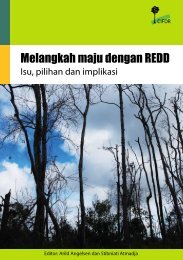Adaptive collaborative management of community forests in Asia ...
Adaptive collaborative management of community forests in Asia ...
Adaptive collaborative management of community forests in Asia ...
Create successful ePaper yourself
Turn your PDF publications into a flip-book with our unique Google optimized e-Paper software.
74 • Cynthia McDougall, Hemant Ojha, Raj Kumar Pandey, Mani Ram Banjade and Bishnu Hari Pandit<br />
knowledge that appeared important to success <strong>in</strong>clude an understand<strong>in</strong>g <strong>of</strong><br />
the concept and practice <strong>of</strong> self-monitor<strong>in</strong>g as a learn<strong>in</strong>g and plann<strong>in</strong>g tool;<br />
an understand<strong>in</strong>g <strong>of</strong> the concept <strong>of</strong> conscious learn<strong>in</strong>g and experimentation<br />
<strong>in</strong> <strong>management</strong>; application <strong>of</strong> bookkeep<strong>in</strong>g and recordkeep<strong>in</strong>g <strong>in</strong> the<br />
field; and some technical forestry knowledge and skills. As with the above<br />
attitudes, the development <strong>of</strong> these skills was a process or an ‘ideal’—they<br />
were not fully achieved <strong>in</strong> all sites.<br />
Outcomes: changes <strong>in</strong> livelihood assets<br />
In this section we explore some <strong>of</strong> the changes that occurred <strong>in</strong> the four<br />
ma<strong>in</strong> case study sites dur<strong>in</strong>g the PAR phase <strong>of</strong> the research. Although we<br />
observed only a one- to two-year period, the outcomes <strong>of</strong>fer <strong>in</strong>sights <strong>in</strong>to<br />
the effects <strong>of</strong> shifts <strong>in</strong> approach, processes and structures <strong>of</strong> <strong>in</strong>stitutional,<br />
social, human, natural and f<strong>in</strong>ancial capital. Follow<strong>in</strong>g this section,<br />
we look at prelim<strong>in</strong>ary f<strong>in</strong>d<strong>in</strong>gs <strong>of</strong> the followup project <strong>in</strong> terms <strong>of</strong> the<br />
<strong>in</strong>stitutionalisation <strong>of</strong> the ACM approach and longer-term outcomes.<br />
Clearly, changes <strong>in</strong> all the dimensions <strong>of</strong> capital were <strong>in</strong>fluenced by multiple<br />
forces. We discuss here the changes we perceive as likely attributable to<br />
the shift towards ACM-based processes and <strong>in</strong>stitutional arrangements.<br />
Although there is no way to def<strong>in</strong>itively prove causality here, many <strong>of</strong> the<br />
changes emerged directly from the CFUGs’ prioritisation and plann<strong>in</strong>g <strong>of</strong><br />
<strong>in</strong>novations and actions <strong>in</strong> the ACM-based self-monitor<strong>in</strong>g and plann<strong>in</strong>g<br />
processes. Furthermore, <strong>in</strong> the track<strong>in</strong>g and assess<strong>in</strong>g <strong>of</strong> the sites throughout<br />
the research period, the research teams observed no other direct forces—<br />
such as nongovernmental <strong>in</strong>terventions or governmental or network<br />
projects—act<strong>in</strong>g on the CFUG processes and <strong>in</strong>stitutions that seemed<br />
causally related to the outcomes 18 .<br />
At the same time, while we believe the shift to an ACM process drove<br />
these changes, we also acknowledge the significance <strong>of</strong> several other<br />
<strong>in</strong>fluences. One was the conflict between the government and Maoists,<br />
which slowed <strong>community</strong> forestry activity because <strong>of</strong> security restrictions<br />
and reduced space for open meet<strong>in</strong>gs <strong>in</strong> the conflict-prone areas. Yet it<br />
may also have opened up some opportunities for CFUGs and other actors<br />
to take leadership roles as government services receded. Furthermore, the<br />
broader democratic movement and awareness <strong>of</strong> equity issues, as well as<br />
direct pressure by Maoists on those they considered elite, likely contributed<br />
to the momentum for shift<strong>in</strong>g power away from the dom<strong>in</strong>ant <strong>community</strong>
















